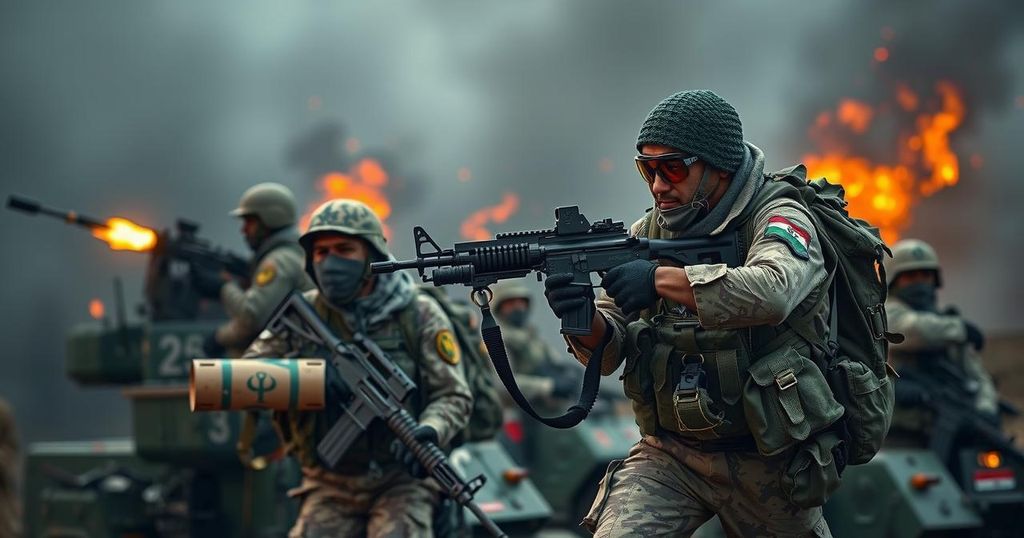Iranian-backed militias have entered Syria to assist President Bashar al-Assad as Russian and Syrian forces conduct airstrikes against advancing rebel groups, resulting in at least 25 civilian casualties. A significant rebel offensive in Aleppo marks a dramatic shift in the conflict, suggesting vulnerabilities in Assad’s military as Iran’s support mirrors that of Russia. The situation presents urgent humanitarian concerns as civilians bear the brunt of renewed violence.
Amid escalating violence in Syria, Iran-backed militias have reportedly entered the country to assist President Bashar al-Assad’s forces as they confront a resurgent rebel offensive. The White Helmets, a prominent humanitarian organization, reported at least 25 casualties from airstrikes attributed to Syrian government and Russian forces during their assault on rebel-held regions in northwestern Syria. This development marks a significant intensification of the conflict, which had seen a prolonged period of dormancy.
The backdrop of this resurgence involves the intersection of various conflicts impacting the stability of pro-Assad forces and highlights Russia’s continued involvement in the region. Military analysts suggest that the Russian focus on the situation in Ukraine has created vulnerabilities in Syria, disrupting air cover that was previously supportive of Assad’s regime. This shift allowed rebel groups, particularly Hayat Tahrir al-Sham, to capture significant territories, including the city of Aleppo, presenting a challenge to Assad’s military credibility.
Reports indicate that Iranian forces, specifically groups such as Katiab Hezbollah and Fatemiyoun, have been dispatched to fortify the Syrian military’s efforts against the advancing rebels. This influx of reinforcements aims to address the escalating situation after a shocking rebel campaign that has challenged the power dynamics established in recent years.
Following airstrikes conducted by Syrian and Russian forces, there have been accounts of significant civilian casualties, with civilians caught amid the hostilities prompting concern from humanitarian organizations. The Syrian government has issued statements claiming that their military operations are targeted exclusively at insurgent strongholds, denying allegations of civilian attacks. As the conflict deepens, the Syrian regime asserts its commitment to maintaining territorial integrity and combating terrorist factions that threaten national stability.
Ultimately, the latest developments in Syria suggest a tumultuous continuation of the civil war that began over a decade ago, with the humanitarian impact being profoundly felt as tensions rise once more. The engagement of Iranian forces alongside Syrian and Russian military efforts underscores the complex interplay of alliances and hostilities that continue to characterize the region’s prolonged conflict.
The Syrian civil war, ongoing since 2011, has been marked by extensive violence and a shifting landscape of power. Initially sparked by anti-government protests, the conflict quickly morphed into a multi-faceted war involving various national and international actors. Iran and Russia have emerged as key allies of Assad, providing crucial military support throughout the years. Recently, a significant rebel offensive has disrupted a relative stalemate in hostilities, creating a situation that necessitates additional Iranian reinforcements to counteract growing rebel gains. Understanding the implications of these developments is critical in assessing the future trajectory of the conflict.
The renewed fighting in Syria, driven by an aggressive rebel opposition and reinforced by Iranian militia support, poses serious challenges for President Bashar al-Assad’s regime. With significant airstrikes resulting in civilian casualties and substantial territorial losses for government forces, the dynamics of the conflict are shifting rapidly. As Russia engages in military operations in the region, the complex interplay of local and global politics continues to shape the course of Syria’s protracted civil war, with no immediate resolution in sight.
Original Source: news.sky.com







